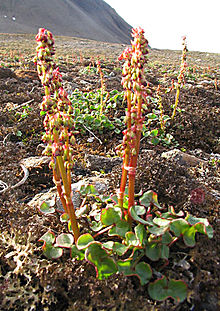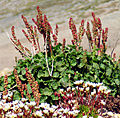- Oxyria digyna
-
Oxyria digyna 
Scientific classification Kingdom: Plantae (unranked): Angiosperms (unranked): Eudicots (unranked): Core eudicots Order: Caryophyllales Family: Polygonaceae Genus: Oxyria Species: O. digyna Binomial name Oxyria digyna
(L.) HillOxyria digyna (mountain sorrel, wood sorrel, Alpine sorrel or Alpine mountainsorrel) a species of flowering plant in the buckwheat family. It is common in the tundra of Arctic. Further south, it has a circumboreal distribution, growing in high mountainous areas in the Northern Hemisphere like the Alps, Sierra Nevada, and Cascade Range.
It grows in dense tufts, with stems 10-20 cm high. Both flowering stems and leaf stalks are somewhat reddish. Leaves are kidney-shaped, somewhat fleshy, on stalks from the basal part of the stem. Flowers are small, green and later reddish, and are grouped in an open upright cluster. The fruit is a small nut, encircled by a broad wing which finally turns red. Forming dense, red tufts, the plant is easily recognized. O. digyna grows in wet places protected by snow in winter. Oxyria (from Greek) means "sour".
Contents
Uses
The leaves have a fresh acidic taste and are rich in vitamin C, containing about 36 mg/100g.[1] They were used by the Inuit to prevent and cure scurvy, and can be used in salads. It is called qunguliq in Inuktitut. The above-ground parts of the plant are edible when cooked [1].
See also
References
External links
 Media related to Oxyria digyna at Wikimedia Commons
Media related to Oxyria digyna at Wikimedia Commons
This Polygonaceae article is a stub. You can help Wikipedia by expanding it.


